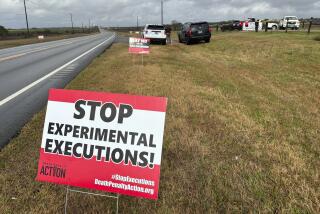Confession in Abortion Doctor’s Death Described
- Share via
PENSACOLA, Fla. — The prosecution’s final witness against a man accused of fatally shooting an abortion doctor testified Thursday that she overheard him admit that he killed Dr. David Gunn “to save a baby.”
Michael F. Griffin confessed to his wife during a jailhouse visit the day after Gunn was shot and killed last March 10, said Escambia County Corrections Officer Brenda Fuqua.
She said Patricia Griffin asked her husband why he did it.
“He said he didn’t do it for any notoriety or any public recognition,” Fuqua said. “He said he killed him because of his beliefs and convictions and, if he had to go to jail for the rest of his life to save a baby, it would be worth it.”
Gunn, 47, of Eufaula, Ala., was shot three times in the back as he arrived for work at Pensacola Women’s Medical Services as the clinic was being picketed by anti-abortion protesters.
The defense began presenting its case later in the day.
Fuqua said she did not report what she had heard until Feb. 17--11 months after the crime--because she was unsure whether it was privileged information.
The defense had objected to her testimony before the trial but dropped that challenge in exchange for a prosecution agreement not to seek the death penalty.
If convicted of first-degree murder, Griffin, 32, would be sentenced to life in prison without parole for at least 25 years.
Also Thursday, two prosecution experts testified that Griffin had a telltale element on his hands after the shooting, but they were unable to positively say it came from gunfire residue.
The level of antimony on his hands was significant but too low to be conclusive, said Daniel Radcliffe of the Florida Department of Law Enforcement and Irving Stone of Dallas County’s crime laboratory in Texas.
Windy conditions and the 33 minutes that passed between the time of the shooting and the swabbing of Griffin’s hands in a police car probably reduced the antimony level, they said.
On cross-examination by defense lawyer Robert Kerrigan, Radcliffe agreed that it was possible that Griffin could have gotten antimony on his hands at the nylon manufacturing plant where he was a chemical worker.
More to Read
Sign up for Essential California
The most important California stories and recommendations in your inbox every morning.
You may occasionally receive promotional content from the Los Angeles Times.













